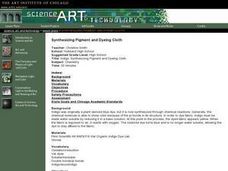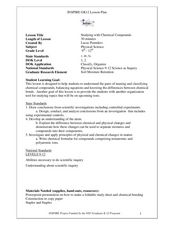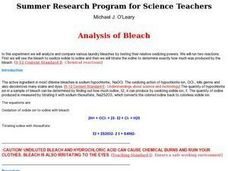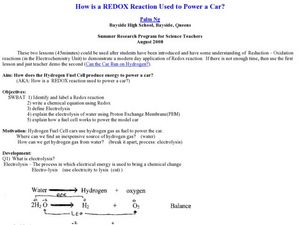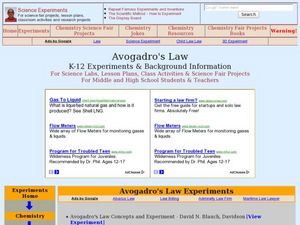Curated OER
Synthesizing Pigment and Dyeing Cloth
Students create a synthetic dye and oxidize the dye and record the effects.
Curated OER
Rusting: A Form of Oxidation
Students observe and record the corrosive nature of oxidation-reduction reactions, and determine the electro-chemical series of selected metals.
Curated OER
Individual Gas Laws
Students learn the relationships between the different properties of a gas and use previous knowledge and make predictions. They predit and explain certain phenomena of gases using their chemical knowledge.
Curated OER
Studying with Chemical Compounds
Students create a foldable to help them remember topics on chemical compounds. In this physical science lesson plan, students differentiate ionic and covalent compounds. Given certain compounds, they identify whether it's ionic or covalent.
Curated OER
Analysis of Bleach
Students analyze and compare laundry bleaches by testing their oxidizing powers. They conduct their lab experiment, compare/contrast their results with other students' work, and complete a worksheet.
Curated OER
Combustion Reactions
Students write a balanced chemical reaction. They articulate how burning fossil fuels increase the carbon dioxide levels in the atmosphere. Students incorporate all the environmental risks involved as well.
Curated OER
Measuring Thermal Energy Transfer
Students conduct an experiment to calculate and quantify heat transfer. They conduct the experiment, and complete a data and lab conclusion sheet.
Curated OER
Activity #6 How Fast Do Reactions Go?
Students name the factors (concentration, temperature, and a catalyst) which can affect the rate of a chemical reaction. They use their knowledge of particle theory to explain their observations. Pupils comprehend that the...
Cornell University
The Galvanic Cell Game
Play a little game with your classes! Young scholars expand on their understanding of oxidation/reduction reactions in a game-based activity. They build a Galvanic cell with game pieces while learning about each component and their...
Curated OER
Shrinky Dinks® Palettes
Here is a fun and clever lesson for teaching physics classes how to calculate wavelength if given the energy and frequency data. On a worksheet, they compute wavelengths using a table of information that you provide. On a paper palette,...
Kenan Fellows
Qualitative Kinetics: Examining the Effect of an Enzyme on a Reaction
Scholars learn about kinetics and buffers as they use qualitative and quantitative methods to understand enzyme rates and buffer capacity. The application of Beer's Law and spectrophotometry solidifies pupils' knowledge in the first of...
Curated OER
Analytical Problem Solving
Students explore about propagation of error in calculations using experimental data. They develop their weighing and pipetting techniques. Students explore the following terms: Standard deviation and relative standard deviatin. They...
Curated OER
Condensation Polymerization: Preparation of Nylon 6/6
Students participate in a lab activity in which they synthesize nylon 6/6, calculate the percent yield by mass, identify the polymer as thermoplastic or thermoset, and determine the melting point, density and end-product use of the polymer.
Kenan Fellows
How Much Heat Can a Phase Change Produce?
Scholars learn about heat release in phase changes. They perform calculations as they compare and contrast a science fiction passage and a home heating application.
Alabama Learning Exchange
Float or Sink?
Experiment with mass and density as scholars figure out what makes things float or sink. First, they watch a podcast introducing these concepts. Be sure to use the comprehension question to test their understanding. Young scientists...
Curated OER
Linkages Between Surface Temperature and Tropospheric Ozone
Students use data microsets of mean near-surface air temperature and tropospheric ozone residual averages to infer patterns. Students analyze changes in tropospheric ozone and then hypothesize about the consequences of these changes.
Curated OER
Bloodstain Pattern Simulations: A Physical Analysis
Students receive bloodstain pattern evidence from a crime scene. They answer a series of questions through inquiry, observation, measurement, and analysis. Pupils complete this challenge, by reconstructing the evidence through four...
Curated OER
Substitution and Elimination Reactions
In this substitution and elimination reactions worksheet, students complete 11 reactions by writing the structural formulas for the products. If no reaction occurs, they write N.R. They also write structures of the products for 3...
NOAA
Ocean Acidification
If tap water is more acidic than ocean water, why are we so concerned about ocean acidification? The third installment of a 23-part NOAA Enrichment in Marine sciences and Oceanography (NEMO) program focuses on carbon dioxide levels in...
National Nanotechnology Infrastructure Network
Nanotechnology Invention and Design: Phase Changes, Energy, and Crystals
What does it take to be considered a smart material? Learners investigate the properties of Nitinol, a smart material, through a hands-on lab activity. They examine the crystal lattice structure and the conditions required for Nitinol to...
Curated OER
What is the Thermal Depolymerization Process?
Students examine the differences between Boyle's Law and Charles' Law. They discuss the concept of thermal depolymerization. They answer discussion questions to end the lesson.
Curated OER
How is a REDOX Reaction Used to Power a Car?
Students explore electrolysis and Redox reactions. For this exploratory lesson students demonstrate an example of electrolysis and how it brings on a chemical change.
Curated OER
Avogadro's Law
Students study Avogadro's law and what it means in science. In this gaseous lesson students complete an Avogadro's law experiment.
Curated OER
So, the Test Is Positive
Young scholars participate in a probability-based exercise. They consider the implications of testing positive for a cancer when the test is less than 100% accurate and analyze their results.
Other popular searches
- Basic Chemistry Equations
- Chemistry Equations College
- Word Equations Chemistry
- Balance Equation Chemistry
- Chemistry Equations Intro


